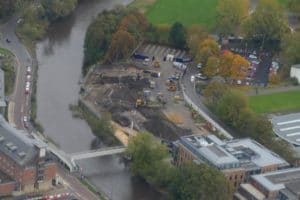Support us from £3/month
We deal with almost 1000 cases a year assisting communities, groups and individuals in protecting their local spaces and paths in all parts of England and Wales. Can you help us by joining as a member?
We have objected strongly to an application from Durham County Council to deregister part of The Sands common in the city centre in order to build a new council headquarters, and to offer in exchange land to the north of the common but quite separate from it.

The Sands coach park with the remainder of the common above (to the north-east). The coach park should have been reinstated to grass to look like the remainder of the common. Credit: North East Civil Air Patrol. Higher-resolution picture available on request.
The application, under section 16 of the Commons Act 2006, will be determined by the Planning Inspectorate on behalf of the Secretary of State for Environment, Food and Rural Affairs.
The Sands is an ancient common, where the Freemen of the City of Durham have rights of common, and the public has the right to walk and ride. The current use of part of The Sands as a coach park is unlawful.
The Open Spaces Society argues that the common should be grassed so that the public can exercise its rights to walk and ride there. Yet the council has erected fencing around it in preparation of development here without consent and without the exchange having been approved.
The land to be offered in exchange is already public open space and so the public will gain little. This land, at Aykley Heads, is about two kilometres away and therefore unlikely to be used by those who currently enjoy The Sands in the city centre.
The application is opposed by the society, the Freemen and the City of Durham Parish Council.
Says Kate Ashbrook, our general secretary: ‘We strongly oppose this application, whereby the council would swap part of The Sands, an invaluable piece of Durham’s heritage and a vital recreation space within the city centre, for land outside the city, which is already managed for conservation and to which there would be very limited new public access. It is not a fair exchange and the public is set to lose out massively.
‘It is essential that the planning inspector, in comparing the two sites, views the existing common as though it was grass.’
Councillor Elizabeth Scott, chair of the City of Durham Parish Council, adds: ‘The parish council has been working with the Freemen of Durham City in opposing this application to deregister the common land. The robustness of our response to the Planning Inspectorate really reflects the public mood about all of this. Not only has the county council unlawfully interfered with the public’s right to access the existing common land by erecting Heras fencing around it but also it is trying to offer up a plot of land which is wholly unacceptable as an alternative.’
The decision of the Planning Inspectorate is awaited. There may be a hearing or public inquiry.
